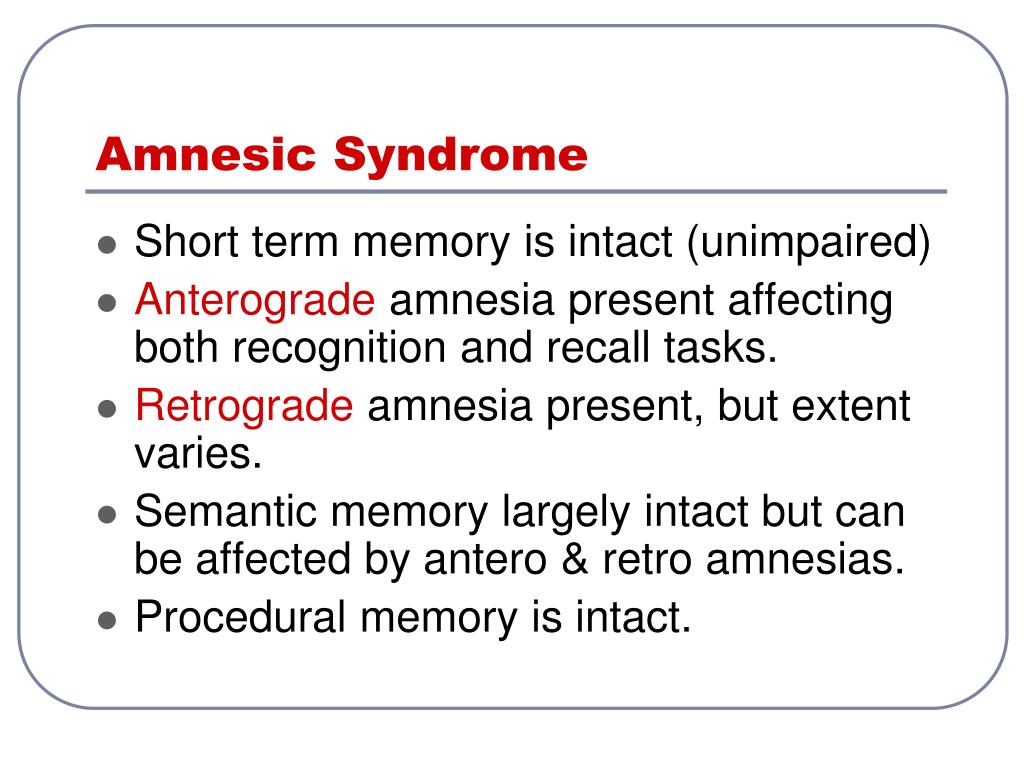

doi:10.1002/gps.4166Īlbers EA, Mikal J, Millenbah A, Finlay J, Jutkowitz E, Mitchell L, Horn B, Gaugler JE.



Social support group interventions in people with dementia and mild cognitive impairment: a systematic review of the literature. Effective occupational therapy intervention with adults demonstrating agitation during post-traumatic amnesia. The effects of electroconvulsive therapy on memory of autobiographical and public events. Lisanby SH, Maddox JH, Prudic J, Devanand DP, Sackeim HA. United states of amnesia: rescuing memory loss from diverse conditions. Genetic and Rare Diseases Information Center. Focal retrograde amnesia: voxel-based morphometry findings in a case without MRI lesions. Dissociative amnesia most commonly occurs in the presence of other psychiatric conditions, particularly personality disorders. These gaps involve an inability to recall personal information, usually of a traumatic or stressful nature. Sehm B, Frisch S, Thöne-Otto A, Horstmann A, Villringer A, Obrig H. Dissociative amnesia is a disorder characterized by retrospectively reported memory gaps. Classic and recent advances in understanding amnesia. doi:10.1016/j.neuropsychologia.2013.09.015Īmerican Psychological Association. The nature of anterograde and retrograde memory impairment after damage to the medial temporal lobe. Smith CN, Frascino JC, Hopkins RO, Squire LR. Traumatic brain injury (TBI): Damage to the brain due to stroke, injury, or other causes can lead to memory loss.Seizures: Seizures due to epilepsy or other causes can also damage areas of the brain associated with memory.People with Korsakoff's syndrome experience symptoms of retrograde amnesia caused by decreased hippocampal volume. Nutritional deficiencies: Excessive, chronic alcohol intake can lead to a thiamine (B12) deficiency called Korsakoff's syndrome.Infections: Brain infections such as encephalitis can sometimes cause retrograde amnesia.It may improve with time, but some people experience persistent memory gaps. Electroconvulsive therapy (ECT): ECT is a treatment for depression and other psychiatric conditions that involves inducing a seizure with a brief electrical current.Disease: Progressive conditions such as Alzheimer’s, Huntington’s, and multiple sclerosis may lead to symptoms of retrograde amnesia.Cardiac arrest: A heart attack can lead to a temporary lack of oxygen to the brain, which may lead to retrograde amnesia, other cognitive problems, or brain damage.Afterward, my son insisted that I get the cut stitched and walked me to the emergency room, where the intake doctor ruled out any medical explanation for my fall and told me to take it easy for the rest of the day. I had not hit my head and had no headache or bruises, but probably cut my chin on the bike basket.ĭuring the intervening minutes, although I remember none of this, I had apparently walked the bike to my house, brought in my backpack and helmet and put a package of spinach into the refrigerator. I do recall feeling great as I started a slow uphill ride on my block, something I do daily, and then remember nothing else until about 30 minutes later, when I left my house to retrieve my bicycle while holding a wet paper towel under my bleeding chin. I was not dizzy, there was no obstacle I might have hit, and I have no memory of almost falling. I now wonder if what I thought was a mild concussion was really TGA when on a beautiful September morning in 2017 I seem to have fallen off my bike for no apparent reason after swimming laps.


 0 kommentar(er)
0 kommentar(er)
